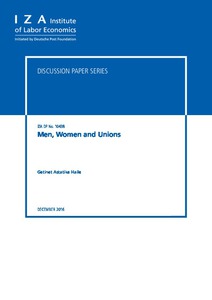Employee representation and flexible working time
"This paper provides evidence on the effect of employee representation on working time flexibility in private-sector European establishments. A 2002 European Union directive granted information, consultation and representation rights to employees on a range of key business, employment and work...
| Main Authors: | , |
|---|---|
| Institution: | ETUI-European Trade Union Institute |
| Format: | TEXT |
| Language: | English |
| Published: |
Bonn
2016
IZA |
| Subjects: | |
| Online Access: | https://www.labourline.org/KENTIKA-907212472549-employee-representation-and-fl.htm |
| _version_ | 1771659894250799106 |
|---|---|
| author | Burdin, Gabriel Pérotin, Virginie |
| author_facet | Burdin, Gabriel Pérotin, Virginie |
| collection | Library items |
| description | "This paper provides evidence on the effect of employee representation on working time flexibility in private-sector European establishments. A 2002 European Union directive granted information, consultation and representation rights to employees on a range of key business, employment and work organization issues beyond a certain firm size. We exploit the quasi-experimental variation in employee representation introduced by the implementation of the Directive in four countries (Cyprus, Ireland, Poland and the UK) with no previous legislation on the subject. The empirical analysis is based on repeated cross-section establishment-level data from the last three rounds of the European Company Survey. Difference-in-difference estimates suggest that the Directive had a positive and significant effect on both employee representation and the utilisation of flexible working-time arrangements for eligible establishments. The greater use of flexible working-time schemes is driven by establishments in which no local wage-negotiations take place and those with a high proportion of female workers. Our results are consistent with the idea that employee representation provides an endogenous rule-enforcement mechanism in second-best scenarios in which incomplete contracting problems are pervasive and third-party arbitration is unfeasible. Quite paradoxically, the relaxation of shareholders' property rights and the limits imposed on managerial discretion as a result of the operation of employee representation seem necessary to achieve certain valuable forms of organizational flexibility in market economies." |
| format | TEXT |
| geographic | EU countries |
| id | 907212472549_017bf581b7e14d59968405918de1abc2 |
| institution | ETUI-European Trade Union Institute |
| is_hierarchy_id | 907212472549_017bf581b7e14d59968405918de1abc2 |
| is_hierarchy_title | Employee representation and flexible working time |
| language | English |
| physical | 36 p. Digital |
| publishDate | 2016 |
| publisher | Bonn IZA |
| spellingShingle | Burdin, Gabriel Pérotin, Virginie EU Directive flexible working time private sector workers representation Employee representation and flexible working time |
| thumbnail | https://www.labourline.org/Image_prev.jpg?Archive=105645792382 |
| title | Employee representation and flexible working time |
| topic | EU Directive flexible working time private sector workers representation |
| url | https://www.labourline.org/KENTIKA-907212472549-employee-representation-and-fl.htm |

